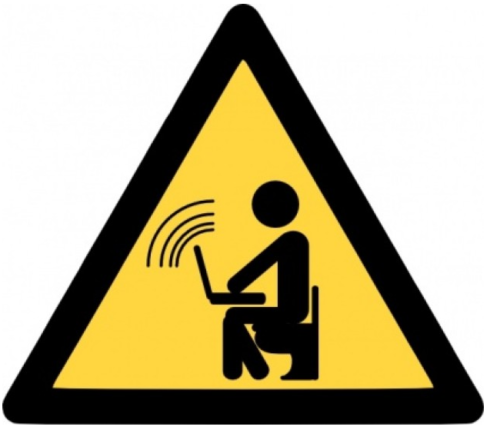
WiFi does not help your consignment software one bit. At home it seems like a great idea. No wires, no mess and it’s just very convenient to be able to move around freely. Your consignment software is different. Consignment software is “high-demand” software in that, it relies on a connection/path to the database. That connection must be there 100% of the time while the application is running. Any network drops or disconnects can and will cause your consignment software to generate program errors.
Depending on the portions of the program/database in-use at that time, you could even end up damaging your database. This is true with each and every consignment software program on the market. You want to do everything you can to protect your database from a disaster. When on WiFi at home, you might not notice the intermittent drops/slow-downs. In addition to intermittent drops, WiFi has a greater “cost” to getting traffic across the network. Each packet has to be encrypted/decrypted and WiFi in general has a greater overhead than traditional, wired Ethernet.
So for your home computers, WiFi makes it easy to keep things nice and neat. You can check your email, Facebook, etc. For your business computers though, it’s a completely different story. Your consignment software needs to be connected to the database 100% of the time. You can imagine a line of customers standing their as your POS station goes down because it lost its network connection. You don’t always get to close out of the program gracefully either. Sometimes you just have to ctrl + alt + delete it.![]()
Think of WiFi like taking a shortcut. You might get their a little bit quicker, but you might have to take some bumpy back roads. There simply is no replacement for hard-wired Ethernet. It’s faster, it’s stable and that translates into reliable consignment software. Wired network connections are like the smooth Interstate highways that let you travel much faster.
There was a great article on Gizmodo recently that compared hard-wired Ethernet vs. WiFi.
How to Ditch Slow Wireless Speeds and Go Completely Wired in Your Home (and Why You Should)
They even brought in a third variable – Power Line connections. Companies such as Netgear have released a device that lets network traffic flow through the electrical wiring within your building. There’s a great video that shows very real-world testing of the three network technologies mentioned above…
For those that aren’t interested in watching that enthralling video on network speed comparisons, it boils down to this – wired network is a faster, more reliable network connection. For people such as gamers, they need their applications to be responsive and available 100% of the time. The same is true with consignment software. Not only that, but as I mentioned earlier you can damage your database if the connection drops.
“Are you saying it is completely impossible to use WiFi for business applications?“
No, I am not. So-called techs that have read books or who like to do this for a hobby tend to overlook TCO. When you have to support customers, software, hardware and networks for a living AND when you have clients that rely on their systems, you get a real-world level of experience that reveals some truths. You realize what actually works and what doesn’t. You realize what helps a business and what hurts it.
Some clients have tried using WiFi in situations where it’s just not possible to use wired Ethernet. You can sort of get away with it and if it’s not a hi-demand system and you understand the risks, it can be done. Seeing what it’s done to databases though, I just can’t recommend that – not as an IT professional. It would be reckless to encourage anyone to use WiFi when a database connection/path is involved. Add to that the security issues wireless connections introduce and you have a mix of cost increasing stresses.
You’ll find each of the consignment software vendors on the market do not support WiFi. It’s for good reason. If you like to gamble, then place your bets on WiFi. If you rely on your consignment software to help keep your business running smoothly (and profitably), then opt for wired Ethernet.

